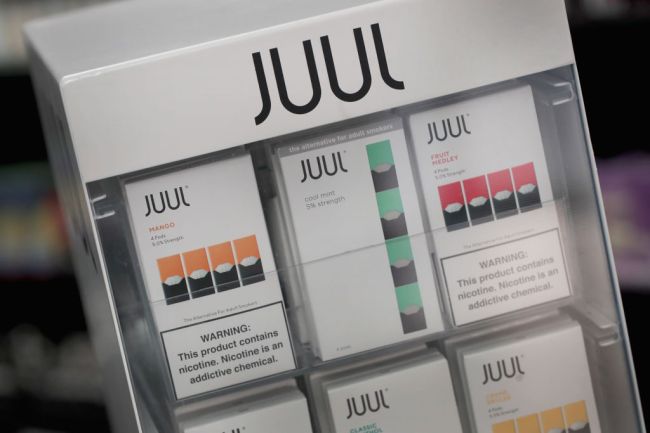Getty Image / Scott Olson / Staff
The U.S. Food and Drug Administration is set to ban Juul e-cigarettes as soon as today, according to a report published on Wednesday from the Wall Street Journal.
Citing people familiar with the matter, the WSJ reported that the FDA would take Juul Labs Inc.’s e-cigarettes off the market as early as Wednesday.
The FDA previously accused Juul of undertaking predatory marketing tactics that may have influenced children and teens. In 2019, Juul attempted to appease the FDA by pulling its e-cigs with fruity and sweet flavors – but kept its menthol and tobacco nicotine pods on the market. However, the FDA has reportedly decided to ban Juul products following a two-year review.
Approximately 2.55 million middle and high school students used tobacco products in 2021, according to the 2021 National Youth Tobacco Survey.
“As previously reported, e-cigarettes were the most common tobacco product currently used among middle and high school students (2.06 million) in 2021,” the Center for Disease Control and Prevention (CDC) said. “This was followed by cigarettes (410,000), cigars (380,000), smokeless tobacco (240,000), hookahs (220,000), nicotine pouches (200,000), heated tobacco products (170,000), and pipe tobacco (80,000).”
Juul has touted its products as a healthier alternative to traditional cigarettes.
Juul products account for 33% of the e-cigarette market, according to the Winston-Salem Journal. The Juul ban opens the door for the Vuse electronic-cigarette brand of R.J. Reynolds Vapor Co. to dominate the e-cigarette market. Currently, Vuse holds 35% of the market share.
R.J. Reynolds Vapor Co. is owned by R.J. Reynolds Tobacco Company – the second-largest tobacco company in the United States.
Juul hit the market in 2015, and would sell 2.2 million e-cigarette devices in 2016, followed by another 16.2 million devices in 2017.
Jull captured 75% of the e-cigarette market by 2018, and at the time the company was valued at $15 billion. By December 2018, Juul Labs Inc. had a value of $38 billion after the Altria Group Inc. – previously known as Philip Morris Companies Inc., one of the world’s largest cigarette manufacturers – took a 35% stake in the company.
However, the e-cig manufacturer lost much of its zip after lawsuits and negative reports about the potential dangers of vaping and combustible e-cigarettes surfaced.
Astria valued Juul at $10 billion in 2020, then the valuation plummeted to $4.3 billion in March 2020.

